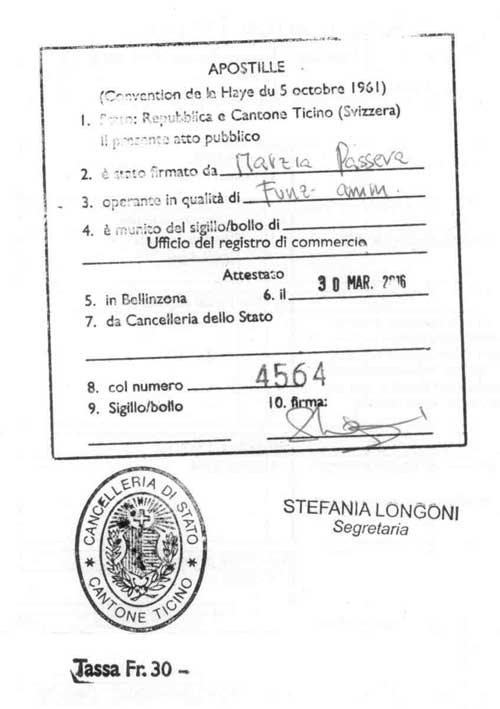 Legalization of foreign documents" />
Legalization of foreign documents" />  Legalization of foreign documents" />
Legalization of foreign documents" />
Schmidt & Schmidt covers the full spectrum of legalization services for documents issued in Switzerland.
Switzerland joined the Hague Convention on the Simplified Authentication of Documents on 10 January 1973; the Convention entered into force on 11 March 1973.
The apostille, or the “Hague apostille” is a certificate that authenticates the origin of a public document (e.g., a birth, marriage or death certificate, a judgment, an extract of a register or a notarial attestation). It confirms the authenticity of the signature and the authority of an official who signed the public document.
Documents issued in Switzerland and certified with an apostille in accordance with the Hague Convention of 1961 are recognized in all Member States of the Hague Convention and do not require any other form of certification, such as consular legalization, which considerably reduces the costs and time required for the certification of documents. So far, more than 120 states have joined the Convention.
The apostille is not sufficient for use in the states that are not party to the Hague Convention. In this case, consular legalization applies to a public document.
Swiss civil status documents and certificates of no impediment for marriage issued in accordance with the CIEC Convention following the International multilingual model are exempt from legalization in any form. More.
In Switzerland, there are two designated competent authorities responsible for issuing Apostilles:
Please refer to the official government resources to find out more, or see a complete list of Cantonal authorities. While pricing can vary depending on the type of document and specific requirements, generally, Apostille certification in Switzerland ranges from 15 to 30 Swiss francs, which is approximately €10 to €20.
The apostille in Switzerland is a square stamp in French, German, Italian, or Romansh with the obligatory heading "Apostille" and a reference to the 1961 Hague Convention in French (Convention de La Haye du 5 octobre 1961). The apostille certificate’s sides will be at least 9 centimeters long.

Switzerland is among the 120 countries that recognize and issue apostilles in accordance with the Hague Convention of 5 October 1961. The apostille serves as a confirmation of the official status of a document.
The apostille process can vary depending on the sender and recipient country, but typically to obtain an apostille for a document in Switzerland, you must go through the following steps:
This process can be time-consuming, especially if it includes multiple documents and different countries. To ensure a smooth and accurate apostille process, it is recommended to seek guidance from specialists familiar with the requirements and procedures. Their expertise can help avoid delays and errors in obtaining documents apostille.
Document requirements that might apply:
The apostille is issued in a uniform format. In Switzerland, it has the form of a printed sticker with a handwritten signature of an official, an official seal, and a hologram.
In cases where apostles are not recognized, holders of foreign documents will need to legalize them instead. However, If the country of destination of the document recognizes and issues apostilles, then legalization is unnecessary.
If you require new original documents, the information here will help you.In order for educational documents issued in Switzerland, such as school reports, university degree certificates, transcripts of records, enrollment certificates, and other certificates from schools or universities, to be valid and recognized abroad, they must undergo a process of certification through legalization or apostille. The certification process is carried out by the Ministry of Justice and Public Order, along with Swiss diplomatic missions/consulates.
The process of legalization can vary based on the country where these documents will be used and the authorities or institutions involved. However, you will most likely be able to choose from the following options:
It's essential to confirm in advance with the authority requesting the legalization whether this procedure is acceptable. Additionally, research the specific regulations regarding legalization at the respective foreign representation in Switzerland. If necessary, the Federal Chancellery in Bern can authenticate the signature and seal of Swiss representations abroad, as well as those of foreign representations in Switzerland.
Switzerland has concluded bilateral agreements with Belgium, Denmark, France, Greece, Italy, Luxembourg, Austria, and Germany according to which certain documents are exempt from any certification if they are sealed by the responsible administrative authorities.
Civil status certificates and certificates of marriageability, which are issued by one of the contracting states according to the model of the Convention of the International Commission (CIEC Convention) for Civil and Civil Status Affairs (CIEC), are exempt from any formality in Switzerland.
Contracting states of the Munich CIEC Convention of 05.09.1980 (issuance of multilingual certificates of marriageability) are:
Furthermore, Regulation (EU) 2016/1191 of 6 July 2016 on public documents simplifies the circulation of certain public documents that must be presented in an EU Member State and have been issued in another EU Member State, thus exempting public documents from the confirmation of authenticity with the Apostille with the aim of reducing administrative burden and costs for citizens.
Consular legalization is the process of authenticating or certifying a legal document so a foreign country's legal system will recognize it as with full legal effect that is carried out by the diplomatic or consular mission of the country in which the document is to be used.
Consular legalization is more complex, time-consuming and costly than the simpler apostille procedure. Whereas apostille is usually issued within one step, consular legalization requires several pre-certifications before a public document can be certified at the embassy or consulate of the destination country.
It is a common requirement that the document has to be translated into the official language of the destination country before submission to the embassy. It is up to the diplomatic mission to decide about the authentication procedure.
The common feature between apostille and consular legalization is that they authenticate an official document for presentation to institutions in another country. However, they have many differences.
| Apostille | Consular legalization | |
|---|---|---|
| Legal effect | Can be used in all countries that are party to the Hague Convention on the Simplified Legalization of Documents. | Use between States one or both of which is not a member of the Hague Convention, or where one of the contracting States has protested the accession of the other. |
| Difficulty | Moderate. To obtain an apostille, contact the competent apostille authority of the state of origin of the document. | High. For consular legalization, various inland authorities and a diplomatic mission of the state of destination must be involved. |
| Pre-certification | Usually not required. | Is obligatory. |
| Attestation at the state of destination embassy in the state of origin of the document | No need to contact the Consulate of the country of destination. | Is the final step of legalization. |
Schmidt & Schmidt provides apostille and consular legalization services for public documents originating from all regions across Switzerland. We handle the entire process, from document review to obtaining the necessary certifications, ensuring that your documents are valid and recognized internationally. With our reliable services, you can confidently use your Swiss public documents abroad.
If the important documents are lost or damaged, or current copies of the documents are needed, the re-issue of the documents is required. It is not unusual for people outside Switzerland to encounter difficulties with obtaining new documents when abroad. Our consultants will help you procure new documents from Switzerland remotely, and we can arrange for your documents to be sent by courier anywhere in the world.
Copies and transcripts of civil status documents can be translated into any language by a sworn translator in Switzerland or the translation can be done in the country of destination. We offer certified translations of civil status documents with further certification. The cost of the work is calculated according to the volume of the document in question.
Any foreign document issued in one country and used in another country must be legalized for use abroad. Therefore, the authenticity of a certified translation from Switzerland needs to be certified by an apostille. Consequently, many authorities may not accept certified translations from Switzerland if the translation has not been properly authenticated in Switzerland for use abroad. To avoid this confusion, translations should better be made in the state of the destination of the document.
We offer a wide range of services and supplies related to the legalization of documents to suit all your needs. If you have a tight budget or need to have your documents legalized in record time, we can find a suitable solution. The deadline begins with the receipt of your documents.
incl. German VAT 19%
Price excl. VAT from 120€
Apostille and consular legalization for document from abroad
incl. German VAT 19%
Price excl. VAT from 140€
Certified translation of documents into foreign language
incl. German VAT 19%
Price excl. VAT from 60€
Express delivery of documents with apostille from abroad is charged separately according to the rates of delivery services.

Send us a request with a copy of your documents by email or via a special form on the website. We will examine your documents and let you know whether legalization is possible, as well as information on the costs and conditions of the procedure. We will need some time to complete the initial review. We will contact you as soon as we have all the necessary information.

It is not necessary to make an appointment or visit our office. Simply send us your documents by courier service and pay the amount due online. If necessary, we are always ready to answer further questions by e-mail or telephone.

The legalization of documents will take some time. Our experts work quickly and efficiently because they know their stuff well. As soon as the documents are ready, we will inform you.

As soon as the documents are legalized, we will send them to you by courier service worldwide. Our company also offers you translation services.
Я заказывал дубликат свидетельства о рождении из РФ с апостилем и переводом на замену старого времён СССР. Всё сделали очень быстро и качественно, прислали документы ко мне домой.
06 September 2024Kanada ve Hollanda'dan birçok resmi belge için noter ve apostil onaylarını Schmidt & Schmidt aracılığıyla aldik. Bilgesu Hanim işini çok iyi yapıyor. Her sorumuza vakit ayırıp detaylı cevap verdi. Tüm aşamaları takip etti ve bizimle irtibat halindeydi. İşlemler çok hızlı bir sekilde sorunsuz tamamlandı. Yardımlarınız için çok teşekkürler.
04 September 2024I really enjoy the service. It was easy to agree on all details online. I received all the documents translated and registered within a month. Thanks
What is an apostille? Why do I need an apostille? How do I get an apostille? - Our video will explain everything you need to know about the apostille. If you have a document that needs to be certified with an apostille for use abroad, Schmidt and Schmidt will assist you! We provide apostille services in more than 100 countries worldwide.
Legalization of a document is a process, which allows to legitimate the document issued in one country for its usage in another. It means, if you want to submit a document, issued in one country, to authorities in a target country, the document must primarily prove its authenticity. Legalization confirms the authority of the issuing official as well as an authenticity of his signature and seal. Legalization is needed for official non-commercial documents.
No, not always. In some cases, countries can make bi- or multilateral agreements that completely revoke legalization of documents for their recognition in the member countries. For example, a CIEC convention from 1976 or bilateral treaties between Germany and Belgium, Denmark, France, Greece, Italy, Luxemburg, Austria and Switzerland.


When foreign documents have to be presented to local authorities, a certified translation is required. These documents therefore must be translated and signed by a sworn translator and then certified by a notary, court or any other authority.
We work with qualified sworn translators and offer you certified translations of various documents such as contracts, extracts from commercial registers, court decisions and certificates into various languages.
The certified translations we offer will be recognized in more than 100 countries.

It often happens that personal documents are lost or damaged. Current copies of these documents are also sometimes required. In this case it is necessary to obtain documents again. Our service allows you to obtain documents remotely in more than 100 countries around the world. We can also legalize documents and deliver them by courier anywhere in the world.
Duplicate birth, marriage, name change, divorce or death certificates may be required to register a marriage abroad, register a newborn child, obtain citizenship or inheritance, data to apply for a pension confirm opening bank accounts and handling other bureaucratic matters.
We ensure that our services are legally flawless and your documents will be accepted in the target country.
We include the cost of our services, government fees, and delivery in the price. You don't need to worry about additional expenses. Obtain an apostille or consular legalization of your documents without registration or subscription.
Stay informed on our latest news.

More than 1.2 million documents have undergone consular legalization in Cuba in 2024. This is an important historical milestone, says the Minister of Foreign Affairs of the Republic, Bruno Rodríguez Parrilla, writes the CubaHeadlines publication.
19 September 2024 
Deputies of the House of Representatives of the National Assembly of Belarus voted in the second reading for the draft law "On the ratification of the Agreement between the Government of the Republic of Belarus and the Government of the Russian Federation on the procedure for recognizing an electronic signature (electronic digital signature) in an electronic document during cross-border electronic interaction," the BELTA news agency reports.
19 September 2024 
The Pakistani Foreign Ministry website and the Associated Press of Pakistan have announced the launch of an online apostille service in the Islamic Republic. The service is said to be available from September 11, 2024.
16 September 2024 
From 2025, Singapore will be able to issue electronic apostilles for documents online, THE EDGE reports. The Singapore Academy of Law (SAL) is working on the implementation of the new technology in collaboration with the Infocommunications Media Development Authority.